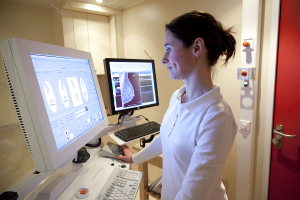COVID-related delays in screening yielding higher late-stage breast cancer diagnosis rate
by
John R. Fischer, Senior Reporter | February 23, 2022

COVID-19 has increased delays in breast cancer screenings and to a lesser extent, colorectal screenings
Due to the ongoing COVID-19 pandemic, late-stage breast cancer diagnoses became more common in 2020, compared to 2019, while early-stage diagnoses became less so.
In a study, researchers at Moores Cancer Center at University of California, San Diego say that while the total number of diagnoses for breast cancer in 2020 remained similar to 2019 numbers, the percentage of patients diagnosed with stage I breast cancer dropped from 63.9% to 51.3%. Conversely, those with stage IV rose from 1.9% to 6.2%.
The data suggests that concerns about the pandemic have led at least some patients to delay routine care such as screenings and doctor visits that could have revealed their cancer early.
Similar trends were also seen among colorectal cancer patients, but at a somewhat smaller magnitude. “We're not able to say why patients are coming in with later stage cancer diagnoses, especially for breast cancer. We think that it may be due to delays in cancer screening related to the pandemic, but that research is still ongoing, and we just don't have a definitive answer yet,” senior author Dr. Kathryn Ann Gold, a medical oncologist at Moores Cancer Center and professor of medicine at UC San Diego School of Medicine, told HCB News.
The study included 55 men (10.5%) and women 467 (89.5%) with a mean (SD) age of 58.1 (13.5) years. At their first presentation, all patients were assessed for a new diagnosis of malignancies or a second opinion in 2019 and 2020.
Providers used the American Joint Committee on Cancer staging modules in the EMR to determine stages of cancer. They then compared stages in 2019 to those in 2020 for cancer overall and for colorectal and breast cancers. The Fisher exact test was also used to compare the proportions of stage I or stage IV breast cancer, colorectal cancer, and all cancers between 2019 and 2020.
Several limitations impeded the study, including the fact that the data came from a single center and does not assess the cause of diseases. The number of patients with colorectal cancer was also relatively small, and the study included individuals who were seeking second opinions when they may or may not have undergone any previous treatment.
Gold says that patients who have delayed preventive care should discuss age-appropriate cancer screening with their primary care physician immediately. She adds that providers also have a responsibility to make patients feel safe and comfortable enough to come in and get screened for cancer during the pandemic. “At UC San Diego Health, we've taken many precautions to ensure the safety of our patients while they are seeking medical care. COVID-19 vaccination is mandated for all staff. We continue to require mask wearing for staff and visitors, and we have cleaning procedures for all equipment and exam rooms, as well as waiting rooms and other common areas.”
|
|
|
You Must Be Logged In To Post A Comment
|
